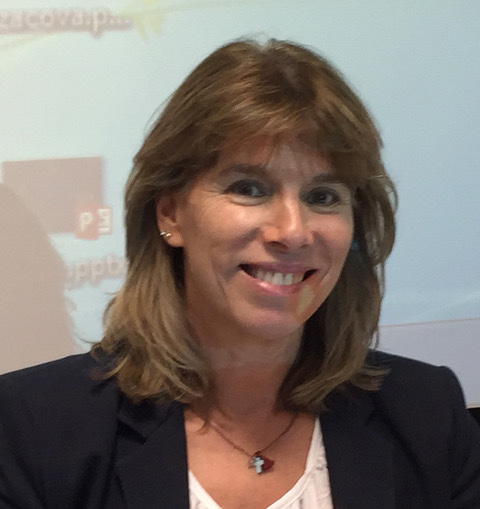Women in Science profiles: Graça Soveral

 Graça Soveral is Professor and Vice-Dean at the Faculty of Pharmacy, University of Lisbon, Portugal, and is PI at Research Institute for Medicines (iMed.ULisboa), where she leads the Membrane Transport group. She is the President of the Portuguese Biochemical Society (SPB), a member of the FEBS Fellowships Committee, and Co-Chair of the IUBMB–FEBS–PABMB Congress in Lisbon, Portugal, 9–14 July 2022.
Graça Soveral is Professor and Vice-Dean at the Faculty of Pharmacy, University of Lisbon, Portugal, and is PI at Research Institute for Medicines (iMed.ULisboa), where she leads the Membrane Transport group. She is the President of the Portuguese Biochemical Society (SPB), a member of the FEBS Fellowships Committee, and Co-Chair of the IUBMB–FEBS–PABMB Congress in Lisbon, Portugal, 9–14 July 2022.
What have been your major scientific achievements?
I am a pharmacist, but since my PhD research I fell in love with investigating cellular communication mechanisms, in particular membrane transport systems, which are essential for health and important therapeutic targets in many diseases.
My scientific interests are centered on investigating mechanisms underlying transporter defects that may lead to disease. My research focuses on membrane water channels (aquaporins) as targets for drug action, identifying mechanisms of aquaporin regulation and discovery of modulators for diagnostic and therapeutic applications.
We have recently reported a group of metallodrugs (gold compounds) as selective and potent aquaporin inhibitors. We have contributed to unveiling of the crucial role of aquaporins in obesity, inflammation and cancer, hopefully paving the way for the development of novel pharmacological approaches.
What do you see as the most important impact of your work?
We are currently investigating diseases whose etiology might be supported by aquaporins’ dysfunction or aberrant expression (cancer, obesity, inflammation). Our selective inhibitors are being validated in animal models upon pharmaceutical formulation, to evaluate their therapeutic index and translational potential. A great and rewarding impact would be the recognition of aquaporins as therapeutic targets and their modulators as drug hits.
in addition to scientific credit, motivating students to pursue a research career is also a great cause for joy.
What have been the main challenges that you have faced so far and how have you overcome those?
Throughout my scientific career, I have overcome many challenges: being a teacher, a scientist, a mother and a wife – this means working in a multitask job with high demands that are not always easily achieved. In academia, we have to take on teaching, research and administrative tasks and deal with all duties on a daily basis.
For me, the only way to survive is to invest in planning and devote the best attention to each issue in due time. The lack of investment in science in my country has also been a difficult problem to face, which sometimes was overcome thanks to valuable international collaborations.
What would be your advice to young women researchers who are aiming at a career in academia?
My brightest students in fact were women. My advice is to chase their dream, because intelligence, hard work and resilience are the ingredients for a successful career. You have to keep learning to be a good teacher.
How do you make the best out of failures?
We all make mistakes, and we have to learn from them. The best way to deal with failure is to look on the bright side – the glass half full instead of half empty. Take the opportunity to grow, to increase experience and knowledge. Ask advice when needed. And don't give up...
What is the most important issue that needs to be addressed to achieve gender equality in academia?
In my academic area gender equality is not an issue, but regarding career promotion it is always more difficult for women to reach top positions. Offering women more opportunities to lead research, encouraging career promotions by quality and merit, and increasing visibility in conferences and in executive committees are measures that will actively contribute to promote women in science. We need to fight for gender equality in leadership, and I believe that sooner or later we will succeed!
Top image of post: Cover image from Soveral, G. et al. (2016) Aquaporins in health and disease: new molecular targets for drug discovery. Boca Raton, FL, CRC Press, Taylor & Francis Group. http://bit.do/aquaporins





Join the FEBS Network today
Joining the FEBS Network’s molecular life sciences community enables you to access special content on the site, present your profile, 'follow' contributors, 'comment' on and 'like' content, post your own content, and set up a tailored email digest for updates.